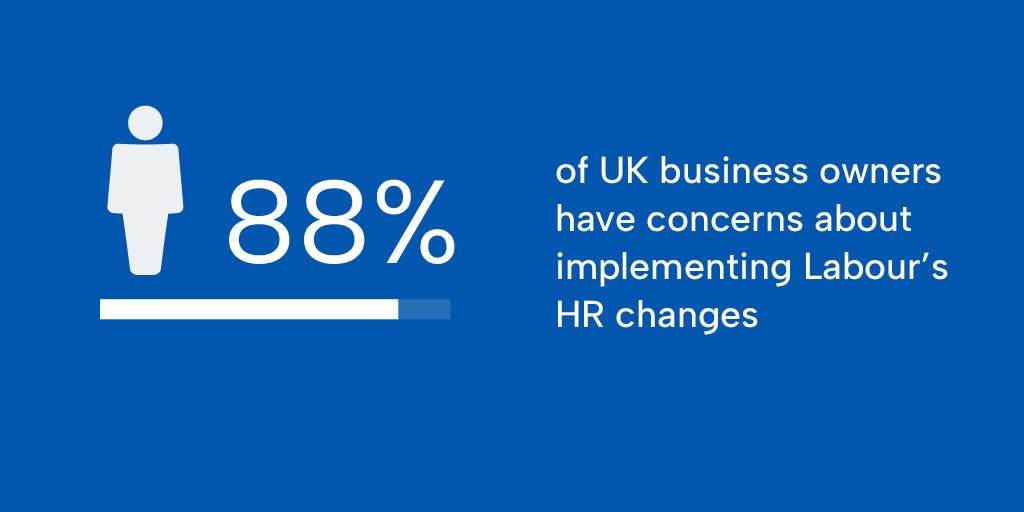First published on Wednesday, September 4, 2024
Last updated on Wednesday, September 4, 2024
Anyone who works in HR or regularly reads the news will have known for a while about the 60+ employment law reforms that Labour has proposed as part of its ‘Plan to Make Work Pay.’
But how aware is the business community?
In light of Labour proposing one of the biggest shake-ups to employment law the UK has seen in decades, BrightHR surveyed business owners across the country to find out how prepared they are for significant adjustments to their HR and operations.
Read on to find out the results and get actionable insights to help you prepare for upcoming legislative changes.
Who took part in the survey?
The survey was completed by small business owners in the UK between Wednesday 8th and Sunday 18th August, covering a variety of industries including construction, education, retail, healthcare, financial services, and transportation.
- 47% of businesses had up to 10 staff
- 34% of businesses had between 11-50 staff
- 19% of businesses had 50+ staff
How aware are business owners of Labour’s 60+ changes to employment law?

We asked business owners to let us know how aware they are of Labour’s proposals, with options ranging from ‘very aware’ to ‘completely unaware’.
Here are the results:
- 26% of business owners said they were ‘mostly unaware’ of Labour’s proposals, with a further 9% reporting they were ‘completely unaware’
- Just under a quarter (23%) said they were ‘very aware’, and a sizeable minority (42%) said they were ‘partially aware’
Given that changes to the National Minimum Wage were already announced in July, and a raft of other reforms are expected as early as October this year, the fact that over 1 in 3 UK business owners are unaware of Labour’s proposals is concerning.
To implement employment law changes effectively—whether by updating policies, issuing new contracts, or retraining staff on new procedures—business owners need to keep their fingers on the pulse of what is changing and when, or they could face legal challenges.
Understanding the potential impact of the different employment law changes on the horizon, and then making sure you have all the tools you need to implement these correctly, is the best way to minimise legal, financial and reputational risk to your organisation.
For additional support, ask our instant advice tool Brainbox: What changes will the new Labour government make to employment law?
Are business owners aware of the employment law risks associated with Labour’s proposed changes?
Being aware of the employment law changes heading our way is one thing but staying vigilant to the legal and financial risks associated with them is another.
Almost every aspect of the employment relationship will be impacted by Labour’s plans – from onboarding new starters to dealing with parental leave, sick pay, and unfair dismissal claims. Putting a foot wrong in any of these areas could land businesses in legal hot water and increase their risk of compensatory claims and reputational damage.
And yet, according to our survey, almost half (48%) of UK business owners are unsure or unaware of the employment law risks involved in Labour’s agenda for workplace reform. Under a third (30%) said they were ‘partially aware’, while only 1 in 5 (22%) said they were ‘very aware’.
By understanding the risk profile attached to each of Labour’s proposed reforms, as well as how likely they are to be implemented and when, business owners can determine which HR changes that will be most important for them to make both in the short- and long-term.
How confident are business owners in their current HR and employment law policies and practices?
Labour might be changing the laws, but that doesn’t mean existing employment laws aren’t already a challenge. According to previous research, about half of all small businesses handle HR matters in-house – and yet more than 80% of these HR decision-makers don’t have HR training, education, or experience or aren’t confident in their HR skills.
This uncertainty was reflected in our survey. Almost half (42%) of the business owners we surveyed said they were not confident their current HR practices were compliant with existing employment laws, while over a third (37%) said they were only ‘partially confident’. Only 1 in 5 feel fully confident that their existing policies and practices are compliant with the law.
“These results point to a significant knowledge gap among UK business owners, not only in terms of what the law is, but also what HR policies and practices they need to have in place to stay compliant. Getting employment law wrong can be incredibly costly, leaving businesses at risk of tribunal claims, legal fees, and reputational damage. As such, it’s critical that business owners regularly review their HR policies and processes and ensure they have the correct policies, procedures, and documentation in place. Especially now, with over 60 employment law reforms on the horizon, affecting everything from sick pay and parental leave to new day-one rights, I would advise business owners to be proactive in seeking expert HR advice so that they can implement changes confidently and compliantly when new legislation comes into effect." — Lucy Cobb, Employment Law Expert
How confident do business owners feel about implementing Labour’s changes?
When it comes to employment law, it’s often uncertainty and lack of confidence that holds businesses back from making changes effectively.
We asked business owners: Do you feel confident in what you’ll need to change in your business when Labour’s proposed employment law changes come into effect?
Here are the results:
- 50% said they are not confident or unsure
- 37% said they were only ‘partially’ confident
- Only 13% of business owners said they were fully confident in the changes they’ll need to make to their business
“With only 13% of business owners feeling confident about what they’ll need to change under Labour’s Plan to Make Work Pay, it’s clear there’s a greater need for employment law resources and practical advice.” — Lucy Cobb, Employment Law Expert
Staying in the loop with employment law with on-demand webcasts can be a great way to quell any worries and get more confidence when it comes to changing employment laws.
How equipped are business owners to tackle the changes in terms of their current systems and expertise?
We asked business owners how equipped they felt in terms of their expertise and ability to make policy and procedure changes in-house ahead of October.
- Only 19% of business owners felt fully equipped with the in-house expertise needed to introduce all the proposed changes by October, and 41% felt ‘partially equipped’
- 39% were either ‘unsure’, ‘not equipped’, or ‘completely unequipped’
This highlights the need for business owners to consult expert HR advisors and actively review the HR changes they’ll need to make and when.
What’s the most difficult change for business owners to prepare for?

As part of their plan to ‘Make Work Pay’, Labour plans to introduce day-one rights for all workers. This will remove the qualifying period for unfair dismissal, so all staff are protected against unfair dismissal from day one.
78% of business owners believe it will be difficult to implement the changes to day-one worker rights.
The top three challenges they identified were:
- Updating policies (47%)
- Staff training & procedures (37%)
- Management training & procedures (30%)
These findings highlight that overcoming the challenges posed by new day one rights will require expert HR advice, policy, and training support to keep up with new rules and regulations.
With training a rising concern, businesses will need to upskill their HR managers on new rules like day-one rights, unfair dismissals, and flexible working with HR Learning Management Systems to avoid employment tribunal claims.
What steps are business owners taking to prepare for legislative changes?
The majority of business owners (57%) said they were preparing for upcoming legislative changes by monitoring the news and reading information online. Others said they were starting to prepare by auditing their current HR policies and processes (23%) and improving their use of their internal HR systems (17%).
Over 1 in 4 (27%) reported that they hadn’t started to prepare at all.
“There are several ways that business owners can start preparing now for employment law changes, even if, like many of Labour’s proposals, the details of these changes have not yet been confirmed or set in stone. Beyond reading the news and following politics on TV, I would advise finding a reliable and consistent source of information such as an HR newsletter or employment advisory service.” — Lucy Cobb, Employment Law Expert
How likely are business owners to seek advice to better understand and implement the changes?
When it comes to employment law, tackling changes or trying to understand the impact alone can be daunting. So, we asked business owners: How likely are you to seek expert advice to understand the proposed changes by Labour and implement them?
Here’s what they said:
- 61% of businesses plan to seek external expertise to help them understand and implement the changes, with 34% saying they were ‘likely’ to seek expert advice and a further 27% ‘highly likely’
- 13% said they were unlikely to seek external help, with the rest being unsure
“There are several proposed changes that if navigated incorrectly, put business owners at risk of defending against a large compensatory claim, and most likely, reputational damage. Because of this, seeking external support is advisable, especially as the 13% of business owners unlikely or unsure could be leaving their business vulnerable to costly legal risks.” — Lucy Cobb, Employment Law Expert
What are the biggest concerns for business owners relating to the proposed changes?
Out of the 88% of business owners who are concerned about these upcoming changes, their number one concern is the time it will take to implement the changes (42%). This is closely followed by concerns about the cost associated with implementing new changes (40%).
Another huge concern was the monetary risk to their organisation if the changes were not implemented correctly (24%).
With the government reporting fines totalling £80m in 2022/23, and the average cost of an employment tribunal to business owners ranging from £4,500 to £30,000, this fear isn’t unjustified.
Lessons from our survey
The results of our survey show that although some business owners are aware of the high volume of employment law changes on the way, the vast majority are unsure about the potential impact on their business and lack confidence in their expertise and ability to implement the changes.
With time and cost being the number one biggest concern, it’s clear that business owners need fast solutions to help them adapt quickly to change. Solutions that help businesses minimise the cost of updating their employee practices, documents, templates, and policies will be crucial in the coming months.
For a visual representation of the results download your FREE copy of the full report.







